
The Teleporter Thought Experiment
A man walks into a teleporter. He pauses for thought while it scans the physical state of every single molecule in his body. In a few moments, his entire physical being—his brain, heart, blood vessels, cells, genes, and even the contents of his bladder—will be annihilated and instantaneously recreated from new materials in another teleporter on Mars.
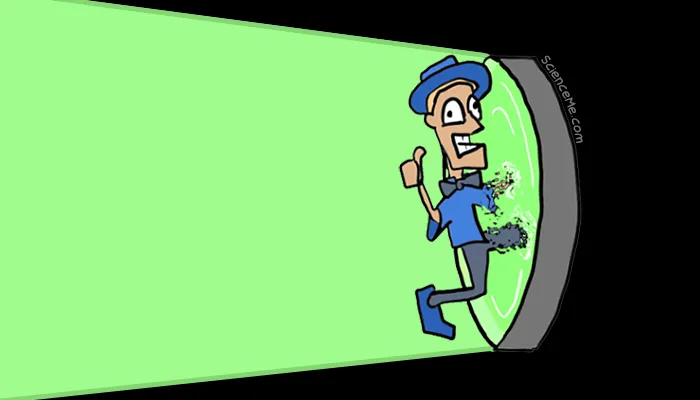
From his perspective, he'll arrive at his destination with no lapse in consciousness, no pain, not even a single hair out of place. But is there some intangible essence to him which the teleporter might fail to replicate? Is there an immaterial mind or inner self about to be extinguished? Will he teleport—or die?
The Identity Paradox
The teleporter thought experiment was proposed by the philosopher Derek Parfit in his book, Reasons and Persons, challenging us to question the nature of consciousness and identity.
If we logically conclude the man's physical destruction equates to his death, we have a problem. His clone won't believe he died, because he's right there, with all the memories of his original self. And because we know our brain produces our reality, we're left with an uncomfortable conclusion.
Our sense of self is an illusion, part of the brain's moment-to-moment simulation of self-awareness.
Is this conclusion reliable? Is the thought experiment flawed? Neuroscience and psychology provide increasing evidence for the brain's simulation of the self. And there are plenty of philosophers who agree, such that a teleporter-induced death of the self would be no different from falling asleep, exiting a room, or shifting between thoughts.
The Mind-Body Problem
For millennia, people assumed the existence of an immaterial mind, extrinsic to the physical brain and home to our sense of self. Descartes formalised this idea as Mind-Body Dualism in the 17th century. And it sort of feels right, doesn't it? But this is the illusion.
At its heart, Dualism fatally violates the four canons of science. The immaterial mind can't be measured. The idea can't be tested or falsified. Most strikingly, it's based on an improbable assumption, and is completely absent from the neurological chain of command. Dualism is better described as a belief than a scientific hypothesis.
To find the immaterial mind, we're faced with the challenge of not knowing where to look, how to detect it, or what it's even supposed to do. For science, it's a wild goose chase.
Until we find direct or indirect evidence of an immaterial mind, science says we can't infer its existence. This leaves us with a new question. If you're not your mind, what are you?
You Are Your Brain
The 17th century philosopher and physician, John Locke, believed consciousness and the self is a matter of psychological continuity arising from physical brain processes. His classic Essay Concerning Human Understanding suggests we're born with a blank slate, and that personal identity develops from an accumulation of experiences.
Modern science upholds this interpretation, with one correction. We are not entirely blank slates at birth. Our genes and epigenetic meanderings pre-load some degree of personality before we're born. So we can expand the theory further to say that identity is constructed by the physical brain, which itself is programmed by the interplay of experience and genetics.
We tend to think our memories belong to our "minds". But the concept of mind is only an abstraction. It helps us put non-physical elements in a non-physical container. In reality, long term memories are produced and stored in the neocortex.
Besides holding up scientifically, Locke's brain-identity theory has both logical and intuitive appeal. Imagine you're Karl Pilkington and you undergo a brain transplant. The real Karl would wake up with the same brain in a new body. Not the same body with a new brain.
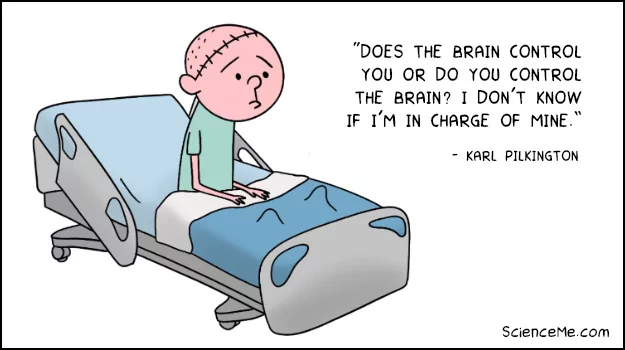
Sweet Karl wrestling with Mind-Body Dualism after a brain transplant.
However, the brain-identity argument is only partially satisfying in light of the many ways to interpret identity. So let's break down the notion of identity a little more.
Identity is Context Dependent
Imagine a pair of neighbouring houses in the middle of an otherwise empty street. Both houses have identical front doors, built from the same type of wood, to the same type of design, and painted identical shades of blue.
The two doors are qualitatively identical because they share the same physical qualities. Yet because they are not one and the same door, they are described as being numerically different. Still, we'd feel justified in saying: "Hey, those two houses have the same door."
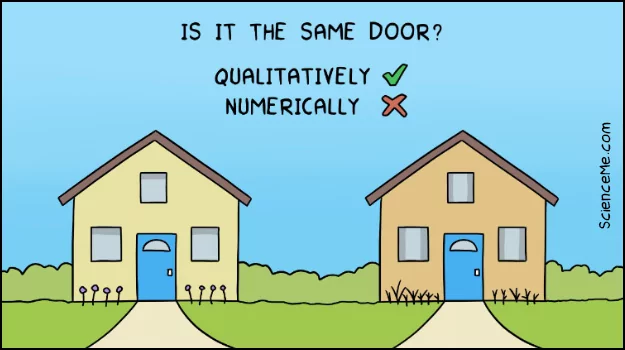
Philosophy breaks down identity into separate categories like qualitative (of traits) and quantitative (of number).
The next day we revisit the houses and see that one door was painted red overnight. The identity of the red door has changed: it's now qualitatively different, but numerically identical, unto itself. We're still happy thinking of it as the same door it was yesterday. Yet we're no longer suggesting it's the same door as its its neighbour.
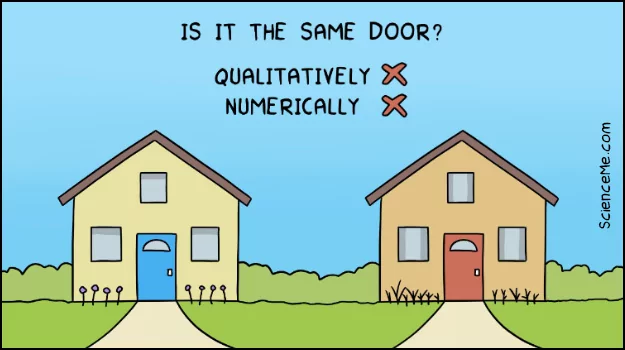
Like you or I, the door can change in quality while retaining the same quantitative identity.
As conscious creatures, we think of ourselves as changing only in qualitative terms. As we age, we get wiser and greyer. We may look and feel different, but we always consider ourselves to be one and the same person.
The teleporter thought experiment blows apart this illusion. When the man's body and brain is destroyed at the molecular level, a second man is recreated from raw materials on Mars. So he's numerically different. Yet because he looks and feels identical to the man that left Earth, he truly is the same person qualitatively.
We're toying with the idea that identity is context-dependent. As you'll see in a moment, we don't need teleporters to prove this. We change, numerically, all the time.
For now, just note that philosophers define identity based on continuity of qualities, or continuity of numerical oneness, depending on the situation. But wait! This just poses a new problem. How do we decide which context-dependent definition to use in any given scenario?
The Ship of Theseus
The Ship of Theseus helps us examine this further. It suggests any sense of continuity of identity is an illusion.
You know Theseus. He was the founder of Athens. And two thousand years ago, Plutarch the philosopher described how Theseus' long-abandoned ship decayed over time. This prompted the Athenians to replace it plank-by-plank until, after thirty years, it comprised none of the original wood.
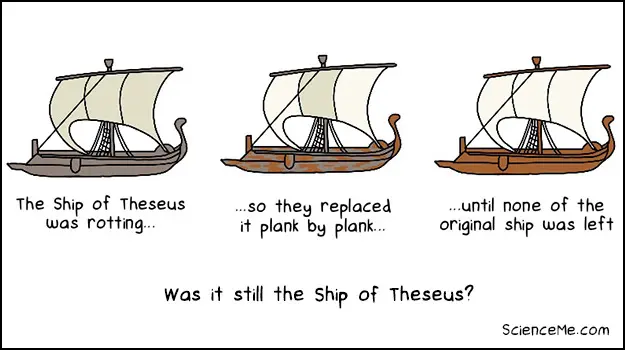
The Ship of Theseus is another thought experiment in the continuity of the self.
Here's the paradox. The ship was qualitatively different—the wood had all new characteristics. And it was quantitatively different too—the ship was the sum of all new parts. Yet there was no definitive point in time when it stopped being The Ship of Theseus.
We might try to claim the transformation occurred at the first, last, or nth plank replaced, but no answer is satisfying because the transformation straddles numerous points along a statistical curve. The same paradox can be applied to our identity.
Every thirty seconds (about the extent of working memory), a new plank is laid down, until you look back ten years and realise you're made of all new planks. Heraclitus nailed this 500 years before Plutarch with a little more poetry.
"No man ever steps in the same river twice, for it's not the same river and he's not the same man." - Heraclitus
If identity evolves along a curve, a series of incremental deviations, then any sense of continuity of self is merely an illusion. We are never truly the same in quality. And biology tells us we're never the same numerically either.
All body cells have a finite lifespan. Some last just days or hours. We undergo a continuous replacement process, much like the Ship of Theseus, until there's virtually nothing left of our original body.
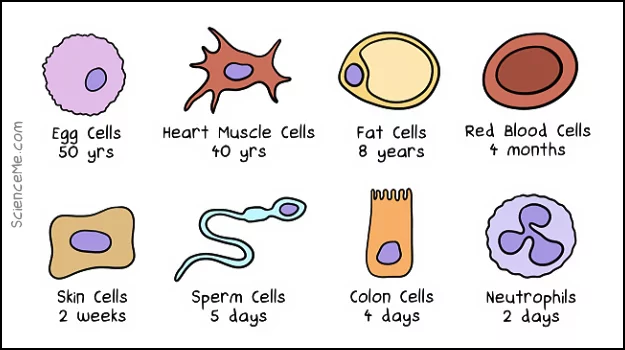
Different cell types have wildly different lifespans.
At even smaller scales, this biological transience increases. From the minute-to-minute secretion of proteins, to the quantum superposition of phosphates in the production of ATP. At all physical and temporal scales, we're in a continual state of flux.
How Often Are We Re-Born?
Just now I suggested new psychological planks are laid down in the brain every 30 seconds. How reliable is this timeframe?
Your brain has the capacity to store incoming sensory information for about 20-30 seconds in short term (working) memory. It allows you to follow a conversation or type out a phone number. After 30 seconds, sensory input fades from awareness, persisting only in long term memory. It's a bit like RAM, if you prefer your analogies digital.
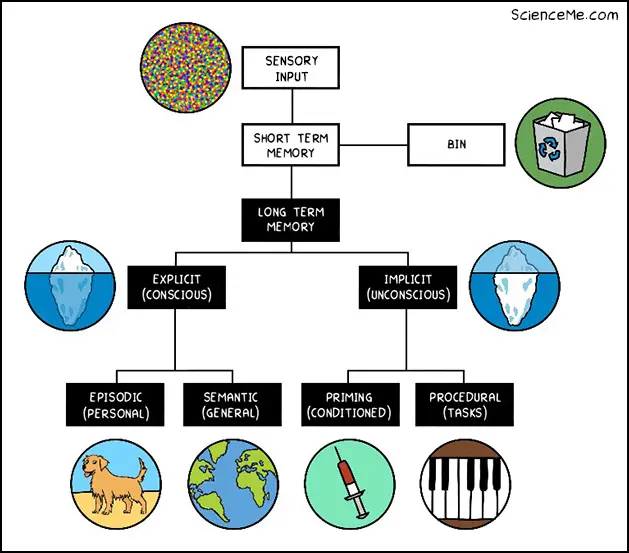
Sensory information can be organised into different types of memories, persisting in working memory for 20-30 seconds.
This 30-second RAM may be the narrowest band of time we can attribute to your psychological sense of self, before it's scattered over numerous emotional and cognitive dimensions in transition. You may feel an ongoing sense of self lasting for years, but this feeling is a cognitive illusion, simulated by your brain to make sense of reality.
We see this illusion break down in brain injury. Clive Wearing is described as the man with the seven-second memory. His life has never been the same after he suffered a brain infection in 1985. It led to a rare case of anterograde amnesia: the inability to create new memories. In the years since, Wearing has endured a continuously overwritten sense of self, with a working memory capacity of 7-15 seconds.
His diary is littered with repetitive statements. "I have woken up for the first time," he writes. "I am alive." These notes are later crossed out. "NOW I am alive," he writes. With no new memories since 1985, he can't makes sense nor identify with himself now.
In a healthy brain, new memories are laid down incrementally, so that our identity evolves incrementally too. Wearing's case is a cruel demonstration of life without continuity of self. His experience underpins the fact that identity is transient at a ludicrous scale.
The Final Twist
If the self is an illusion—a series of experiential packets tucked away into the long term memory stores of the brain—then the man in the teleporter has nothing to fear. He will die, for sure. But it's no different from the death and reawakening you experienced since the start of this paragraph.
As long as the illusion of self continues, all is well. Our identity goes wherever our brain goes, regardless the continual process of cell replacement. Personal identity and a sense of "mind" is just the conscious projection of our ever-changing brain.
We see this played out as massive experiential and behavioural shifts caused by strokes and brain bleeds. Large parts of the brain can die in a matter of minutes, throwing off untold errors in memory, personality, and the sense of self.
Here's one last twist in the thought experiment. Imagine the teleporter is faulty. Not only does it fail to destroy the man on Earth, but it also reproduces him in two separate destinations, on Mars and on Venus. None of them have any sense that their identity has been divided or multiplied.
Will these alien clones be deluded? Certainly. They're not the men they think they are. But they're no more deluded than their Earthman relative. Like us, all three men suffer the same illusion: that they're the same person they were just a minute ago.

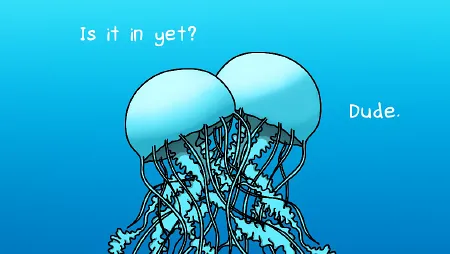
How Do Jellyfish Have Sex?
Jellyfish mastered sex long before us. Frankly, we're the ones odd-balling it with our penises, vaginas, and miserable childbirth.

What is Schrodinger's Cat?
Schrodinger's Cat is a thought experiment created in 1935 by a brilliant scientist who loved quantum physics and hated cats.
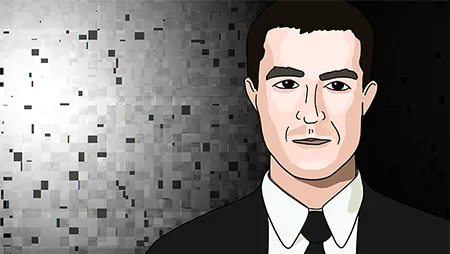
Best Lex Fridman Podcasts
Lex Fridman hosts a popular science podcast in which he digs into the minds of world-class experts and extracts intellectual treasures.
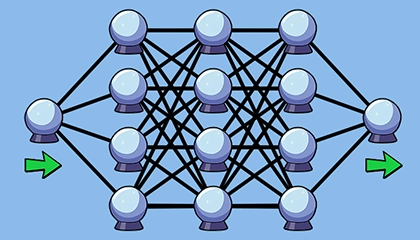
How Does ChatGPT Work?
ChatGPT is a Large Language Model that uses machine learning to do some very clever things that will not literally blow your socks off.
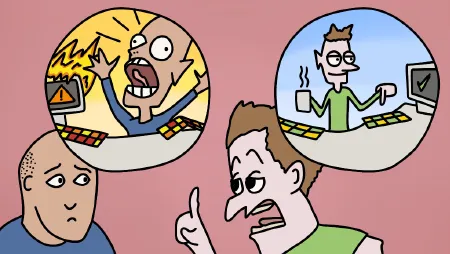
The Biology of Depression
Robert Sapolsky says depression is a biochemical disorder which means you can't enjoy sunsets anymore.
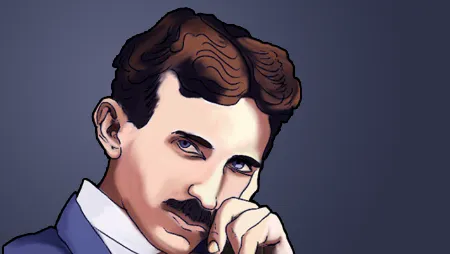
The Life of Nikola Tesla
Tesla practically invented the 20th century, giving us alternating current, wireless radio, x-rays, radar, and transistors.
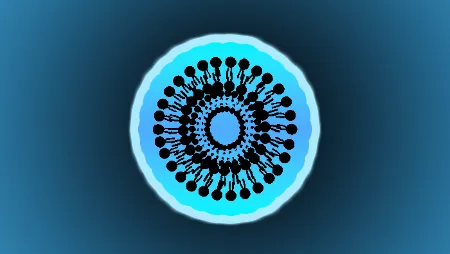
Nanomedicine is Here
Nanomedicine is shaping our lives, with 50+ treatments approved by the FDA including lipid nanoparticles in mRNA vaccines.
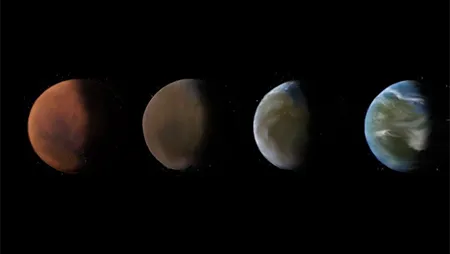
Can We Live on Mars?
What are the challenges of colonising Mars? A look at terraforming and artificial life support to make Mars habitable for humans.